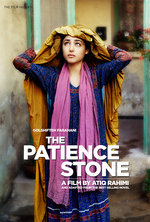Film Screening 5th August, 2014

The Patience Stone (Syngué sabour, pierre de patience)
7:30 PM, 5th August, 2014
- M
- 98 mins
- 2012
- Atiq Rahimi
- Jean-Claude Carrière, Atiq Rahimi
- Golshifteh Farahani, Hamid Djavadan, Hassina Burgan, Massi Mrowat
A Muslim soldier (Djavadan) has been paralysed and is currently in a coma. He is being kept alive by his wife (Farahani), mainly with an improvised serum drip through a tube to his mouth. But a Middle Eastern war continues to rage around them (with tanks blasting holes through their living room wall), and she also has to care for and protect her two daughters. Whilst seeking assistance from her aunt (Burgan), she is reminded of the power of ‘syngué sabour’, the patience stone of Persian mythology, a form of confessional to which burdened souls can confide their fears, longings, deepest secrets and darkest deeds. Her husband then becomes her patience stone, and both flashbacks and recent events tell stories about the struggle of women in a strongly patriarchal society.
It won’t be obvious at first, but this is a good companion piece to Cate Blanchett’s Oscar-winning role from last year in Blue Jasmine. Both are about women in various stages of acute mental and emotional collapse. The main character here, though, is a much stronger person – because of the circumstances she has been raised in, she views her daily struggle as just something she must prevail against.
If you prefer your female empowerment tales to be of a more superficial nature, then hopefully you didn’t miss The Other Woman when we screened it last week. However, for a more universal tale of spiritual and physical emancipation, don’t miss the uplifting The Patience Stone.
Travis Cragg